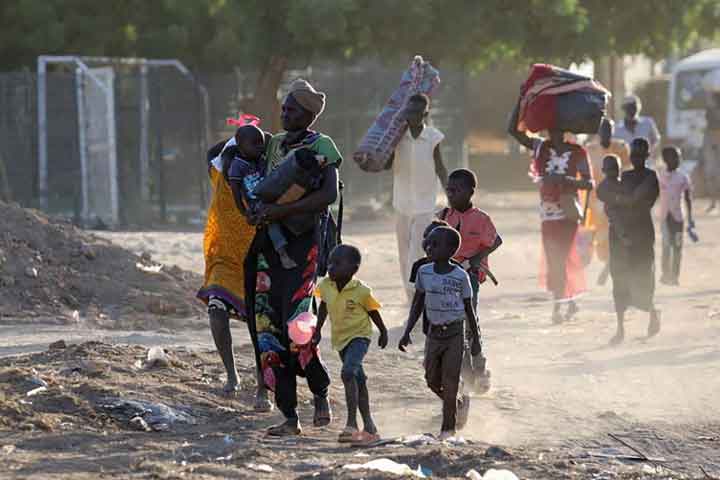International
Sudan bloodshed goes on, EU urges cease-fire
Thursday, 20 April 2023 , 10:06 PM

Battles between forces loyal to the army and the paramilitary group RSF are showing no signs of abating. The violence has taken a heavy toll on civilians.
Fighting in Sudan entered its sixth day on Thursday, as explosions and gunfire rocked the capital, Khartoum, and the adjacent city of Omdurman, prompting thousands of residents to flee.
The bloodshed, which has so far claimed the lives of over 330 civilians and left many wounded, shows no signs of letting up.
Battles are continuing between forces loyal to the head of the army — Abdel Fattah al-Burhan, the country's de facto ruler — and his deputy, Mohamed Hamdan Daglo, known as Hemedti, who commands the the paramilitary RSF group.
Both men, with a long history of human rights abuses, are battling for control of Africa's third-largest country, which is rich in natural resources.
The violence has left many civilians trapped indoors and desperately seeking essential supplies, including food, water and medicine.
Many residential and commercial buildings have been damaged, while hospitals have stopped functioning.
Around 70% of hospitals near the clash sites throughout the country are out of service, the Sudanese Doctors Syndicate said Thursday. At least nine hospitals were bombed, it added.
Thousands of Sudanese, including women and children, have fled the capital since the outbreak of the violence. Many are still trying to escape the battle zones to safer areas.
Why is the fighting not stopping?
Both the warring parties said earlier they would respect a 24-hour cease-fire that was due to come into effect at 6 p.m. local time (1600 GMT) on Wednesday. But the truce was quickly broken by renewed fighting.
Wednesday's cease-fire was the second to fail in two days. A previous truce had been planned from sundown Tuesday to sundown Wednesday, but it never came to fruition.
Patrick Oyet, a journalist and political analyst based in Juba, in neighboring South Sudan, told DW that the fighting "is still ongoing" and it "doesn't look like it will stop."
He noted possible reasons as to why the cease-fire announcements haven't brought much relief so far: "One side thinks I may win the fighting outright. Another one thinks maybe I should first gain more ground so that when we begin negotiations, then I am having an upper hand. So those are possibly the reasons as to why the fighting is really not stopping."
How are world powers reacting to the violence?
World powers have been trying to put pressure on both sides to agree and enforce a cease-fire. A number of countries are struggling to evacuate their citizens after the airport and several districts housing foreign embassies were caught up in the violence.
Japan and the Netherlands are stationing more resources in nearby countries like Djibouti and Jordan to react quickly and evacuate their citizens as soon as the situation allows.
The European Union on Thursday called for a cease-fire. "The fighting must stop," EU foreign policy chief Josep Borrell said in Brussels.
He also urged the parties to protect the civilian population and ensure swift and unhindered access to humanitarian aid.
The outbreak of violence undermines efforts to restore democracy in Sudan, Borrell underlined, noting that it also risks causing political instability in the region.
Egypt, meanwhile, said it repatriated dozens of its military personnel who had been held by the RSF. The Sudanese military also confirmed the evacuation, putting the number of Egyptian personnel at 177.
What's the conflict about?
The fighting is the latest chapter in Sudan's political turmoil of recent years.
The country witnessed mass protests against three decades of iron-fisted rule under dictator Omar al-Bashir in 2019. The demonstrations were led by an alliance of pro-democracy activists.
Burhan and Daglo, along with other generals, staged a coup to topple Bashir.
The generals and civilian protest leaders then struck a power-sharing deal with the aim of later holding elections and forming a civilian government.
Burhan and Daglo then jointly orchestrated a coup in October 2021, derailing efforts to hand over power to a civilian government.
Under international pressure, both generals recently agreed to a framework agreement with political parties and pro-democracy groups.
But the signing was repeatedly delayed amid tensions over the planned integration of the RSF into the regular army and the future chain of command.
